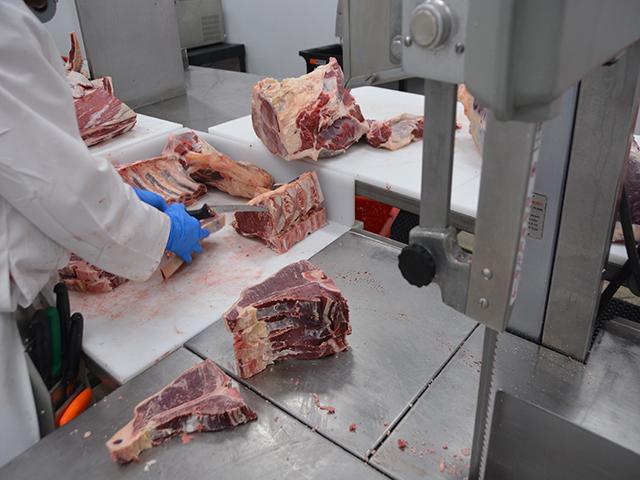New Meat, Poultry Processing Grants
USDA Closes Out $325 Million in Meat and Poultry Processing Grants
OMAHA (DTN) -- After two years of incentivizing more independent meat and poultry processing capacity around the country, USDA on Thursday awarded the final grants under the Meat and Poultry Processing Expansion Program (MPPEP).
Established in the American Rescue Plan, the MPPEP provided more than $325 million to 74 meat and poultry processing facilities nationally, USDA stated. USDA rolled out the first projects in November 2022.
Thursday's grant awards involved $35 million to 15 processors in 12 states. Recipients include:
-- America's Heartland Packing in St. Louis, Missouri, received $10 million. The new beef packing plant, expected to begin operations next year, will process up to 624,000 head annually and create 1,363 jobs.
-- Rocky Mountain Prime LLC in Idaho will receive $5.24 million. A startup project, the company will buy "value-added, source-verified livestock" and process up to 100 head of beef and 500 sheep per day.
-- Damian's Craft Meats in southeastern Michigan will receive $4.17 million. Damian's will offer fee-for-service processing to local livestock producers. The funding will help with land acquisition and other startup costs for the facility.
-- Natural State Processing in Arkansas will receive $3.77 million. Natural State serves poultry producers across eight states processing chicken, turkeys and ducks. The funding will help build and equip a new facility to double the company's processing capacity.
-- Palindromes in Missouri will receive $3 million. Palindromes is a start-up poultry processor that will use the funds to increase processing volume in the region by 570,000 birds annually.
P[L1] D[0x0] M[300x250] OOP[F] ADUNIT[] T[]
-- Old Salt Meat Co., a cooperative processor in Montana, will receive $1.39 million. The funds will allow Old Salt to establish a USDA-inspected facility and expand fabrication space as well as cold storage. The cooperative will be able to increase the number of producers in the cooperative as a result.
Smaller grants were awarded to projects in Colorado, Hawaii, Indiana, Minnesota, Montana, Nebraska, New York and Pennsylvania.
While many of the projects receiving grants are still in development, USDA stated the expansions of facilities already have increased processing capacity by more than 800,000 cattle, 14,000 hogs, 23 million chickens and 5 million turkeys annually. That's resulted in about 1,200 new jobs so far.
Agriculture Secretary Tom Vilsack noted on a call that USDA has used loan guarantees to help fund another 51 processing projects as well as a small processing program that has funded another 75 projects.
"All told, we've invested over $1.4 billion in 462 activities," he said.
Earlier MPPEP grant recipients from Maryland, Montana and Vermont also talked about their projects and the positive outcomes.
Zach Fine, CEO of Holly Poultry in Baltimore, Maryland, said the grant his company received helped the company branch into new retail outlets. Holly Poultry has about 400 employees. Fine said the funds helped deal with processing bottlenecks and develop new products because of packaging capabilities.
"We've now moved into the retail sector with our new retail brand, One Chicken, that is offered through a couple of retailers," Fine said.
Walter Schweitzer, president of the Montana Farmers Union, talked about the Montana Premium Processing Cooperative in Havre, Montana. The co-op was created by 60 livestock producers with the help of the farmers union. The processor received a $292,000 grant under the program in late 2022 to help secure USDA meat inspection.
"It was critically important for us to become a USDA-inspected facility and expand processing capacity," Schweitzer said. He added, "This investment made the difference for more than 70 producers."
Since USDA began funding packing projects, there have been questions about what would happen if a processor sold to one of the "big four" meat processing companies in beef, pork or poultry processing. Vilsack said there are provisions in the grant application. "There are claw-back provisions, things of that nature, in these agreements to address that issue," he said.
The secretary also mentioned a USDA relending program that 34 companies have used to help deal with "rough patches" in their operations.
Vilsack was asked about funding states to support meat inspectors who are needed to help with the growth in capacity. The secretary said Congress makes the decision on how to fund the Food Safety Inspection Service (FSIS).
"That's one of the reasons why we have consistently requested the resources to be able to live up to our responsibility to meet the cost of inspections at the state level for states that have assumed the responsibility of inspection. But we can only provide as much resources as Congress appropriates."
See "As New Beef Packers Continue to Build, Cattle Herd Continues to Shrink" here: https://www.dtnpf.com/….
And see "USDA Opens Wallet for Meat Processors" here: https://www.dtnpf.com/….
Chris Clayton can be reached at Chris.Clayton@dtn.com
Follow him on social platform X @ChrisClaytonDTN
(c) Copyright 2024 DTN, LLC. All rights reserved.



